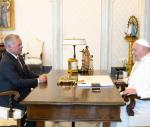You are here
Jordan matters — India and the Hashemite Kingdom
Feb 19,2018 - Last updated at Feb 19,2018
His Majesty King Abdullah will go on his second state visit to India at the end of February following the visit of Indian Prime Minister Narendra Modi earlier this month to Jordan en route to Palestine.
King Abdullah visited India in 2006 when Jordan veered more towards enriching and expanding bilateral ties. However, there was a lull and a hiatus in high-level reciprocal visits from India.
Until 2015, no Indian head of state visited Jordan in the 65 years of diplomatic relations. Former Indian vice president Krishna Kant visited Jordan in 1999 for the funeral of His Majesty the late King Hussein, former prime minister Rajiv Gandhi paid a brief visit in 1988, but no exclusive bilateral visit by an Indian foreign minister took place.
The joint commission had not met for nine years; this is what I told former president Pranab Mukherjee when I made my courtesy call in 2014 before departing to Amman, as he congratulated me for being posted to “a very important and geo-strategic” country in the region. I had no doubt about that. President Mukherjee visited Jordan in October 2015, thus breaking the jinx.
Earlier, Prime Minister Narendra Modi met King Abdullah in New York on the sidelines of the United Nations General Assembly and counter-terrorism summit. Both developed a great liking for one another and decided the core areas of collaboration are being security and intelligence, defence, trade and investment. Counterterrorism was an obvious choice since both suffer from it and are at the forefront of the fight against extremism and terrorism.
New mechanisms for closer intelligence exchange and cooperation in de-radicalisation were instituted. King Abdullah invited India to be part of the Aqaba Meetings against terrorism and radicalisation, and we have actively participated in the event. The joint commission has already met twice, and the foreign ministers have visited. In addition, a $100-million line of credit was announced.
Since 1947, when Jordan and India signed an agreement on cooperation after independence, India has become Jordan’s third largest trade and investment partner and the largest market for the Kingdom’s phosphate and potash industries.
With an investment volume worth $860 million, the Indian Farmers Fertiliser Cooperative Limited and the Jordan Phosphates Mining Company created the Jordanian Indian Fertilisers Company — a flagship joint venture for producing phosphoric acid.
The famous Abdoun bridge in Amman by Larsen & Toubro, the rock phosphate terminal by Afcons Infrastructure Limited in Aqaba, and more than 20 textile units owned by Indians in special economic zones stand testimony to India’s continued interest in Jordanian opportunities.
King Abdullah may pitch for Indian investments in the fields of infrastructure, energy, automotive, ICT, pharmaceutical research and development, higher education and a prospective opportunity in the reconstruction of Iraq and Syria at the India-Jordan Business Forum.
From our perspective, since Jordan has one of the largest deposits of oil shale, it would be desirable to initiate a serious dialogue for future exploration. We should have a long-term agreement for supply of Jordanian phosphate and other minerals to cater to our agricultural requirements. Thus, Jordan can easily play a significant role in our food and energy security.
Jordan is keen on attracting Indian tourists as well as Bollywood to its historic and religious sites, where yoga is already very popular. Jordan grants Indians an entry-upon-arrival visa, while India also offers Jordanians an e-visa. Direct flights will boost tourism.
During this visit, we may witness an institutionalisation of defence cooperation and signing of several agreements in media cooperation, upgrading of trade and investment targets, diplomatic visa-free travel, etc.
The King might also visit higher institutes of technology, apart from directly meeting business leaders. While India provides capacity building assistance under the Indian Technical and Economic Cooperation Programme, it might consider setting up a centre of excellence in Jordan.
For us, Jordan could be a reliable partner in counterterrorism and de-radicalisation efforts, a preferential gateway for our trade, services and investment to the Western and Arab markets.
King Abdullah appreciates India’s civilisation, vision for development and progress, as well as a principled foreign policy stand, especially on the Palestine issue. The two sides are on the same page on most international issues that impact our region.
The writer contributed this article to The Jordan Times. He is the former ambassador of India to Jordan, Libya and Malta












